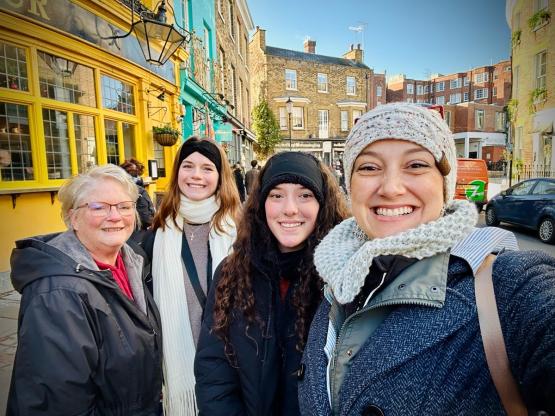
The Southern Ohio Copperheads are in a league of their own. We’re not talking about which teams they play, but the unique model under which the organization operates. The team stands apart thanks to its nonprofit, community-owned and student-operated model, wherein Ohio University students (and occasionally, those from other area colleges) serve in all major roles from general manager down to game-day ticket sales. These students, called “Cheaders” (pronounced like cheddars) are paid a stipend and can apply through the University to have their experience count as an internship.
“This whole thing is exceptionally brilliant for the learning and the experience that these kids get,” says Bill L’Heureux, BSC ’96, chair and president of the Copperheads executive board. “We keep our hands off of how the students run the team; we give them the flexibility to make mistakes, because that is how you learn.” So long as ideas and strategies meet the four main tenets for the organization—safe, legal, financially solvent, and fun and purposeful—the students leading the Copperheads, known collectively as student directors, have the power and support to implement them.
L'Heureux is joined by about 20 other board members from the community, some of whom have served since the team’s inception in 2002, comprising everyone from University staff to business owners to retirees. “We have people who love baseball and are very interested in just supporting the team, and we have other people who could care less about baseball but see the inherent value of what the organization brings to the students, to the community, and to the players,” L’Heureux says.
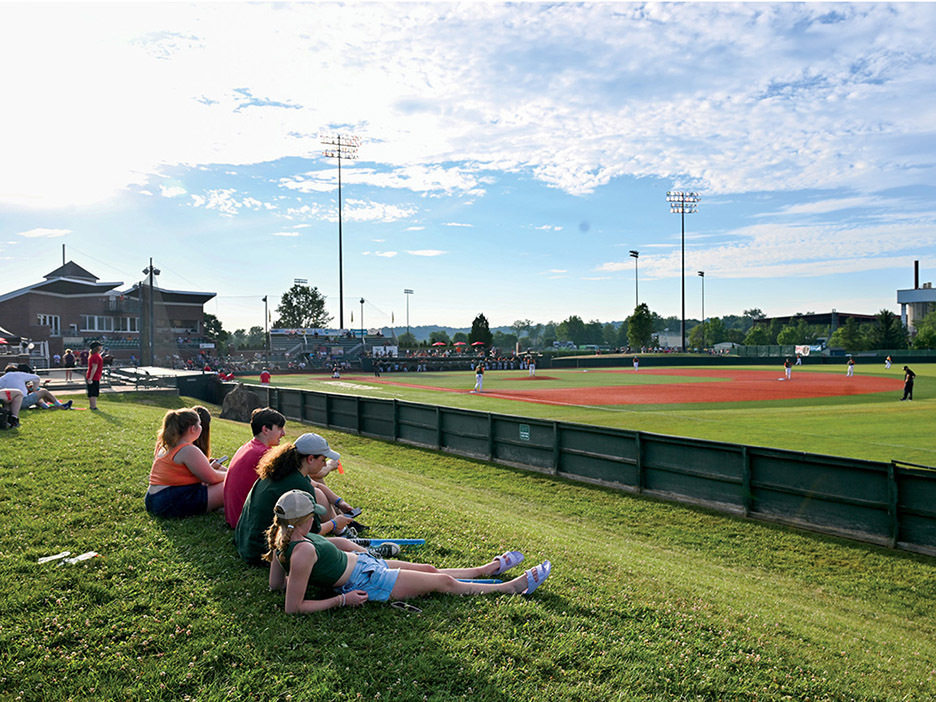
Fans relax on the grass while watching a Copperheads game against the Muskegon Clippers in late June. Photo by Ben Wirtz Siegel, BSVC '02
The community aspect is what initially drew L’Heureux and his young family to some of the first Copperheads games in the early aughts; he refers to it as the “inherent value” of what the organization provides in Southeast Ohio.
“The world is lacking in what they call ‘third spaces,’ where people can go and hang out,” he says. “The Copperheads bring a third space where people can get together with their friends and family and have a fun and safe activity.”
Offering further support for student directors and the game-day staffers they supervise is a small professional staff led by interim executive director Jake Lietzow, BSSPS ’17, MED ’22, who is filling in this summer during the maternity leave of Annie Valeant, MBA, MSA ’08. Lietzow is no stranger to the team, having served as a game-day staffer during his undergraduate studies.
Returning to the team that sparked his love for the business side of sports was “surreal,” he says. “I’ve seen a lot of the same moments that I had as a game-day staffer reflected in the students here now. It hasn’t lost its magic.”
Those moments and that magic are largely tied to what Lietzow describes as meaningful interactions between the Cheaders, the players and the community at large, both on and off the field.
“The Copperheads do a really good job of building community, not just among the staff and players but also the fans who come to our games and events,” he notes. “Everything we do is centered around how it impacts our community.”
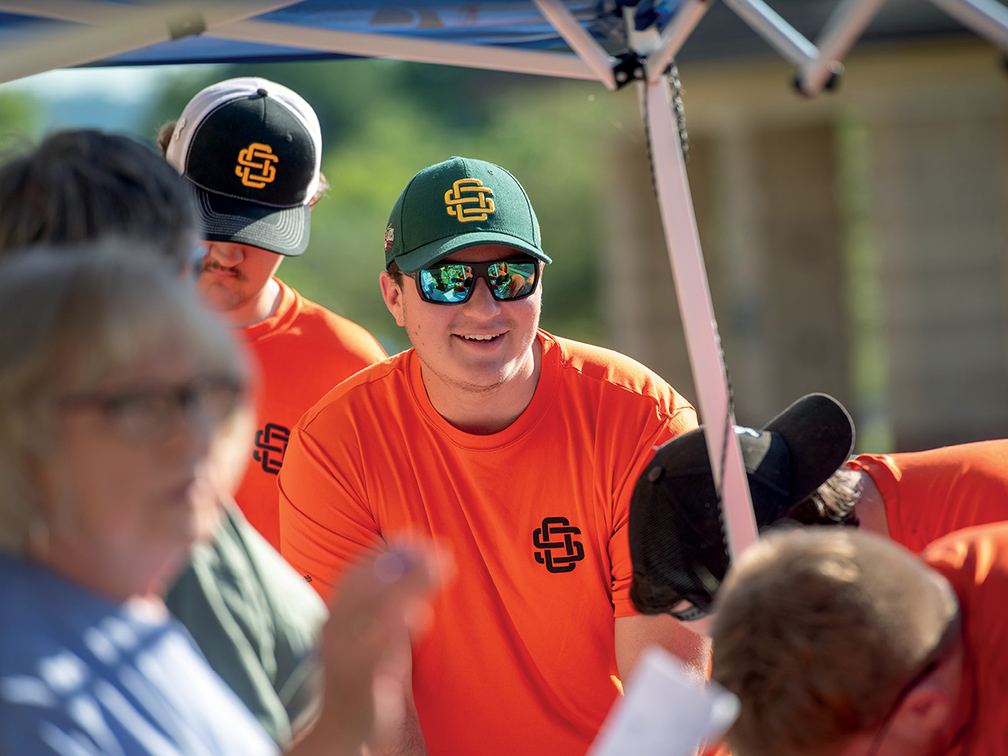
Student directors and game-day staffers run the show at Copperheads games. Photo by Eli Burris, BSJ '16
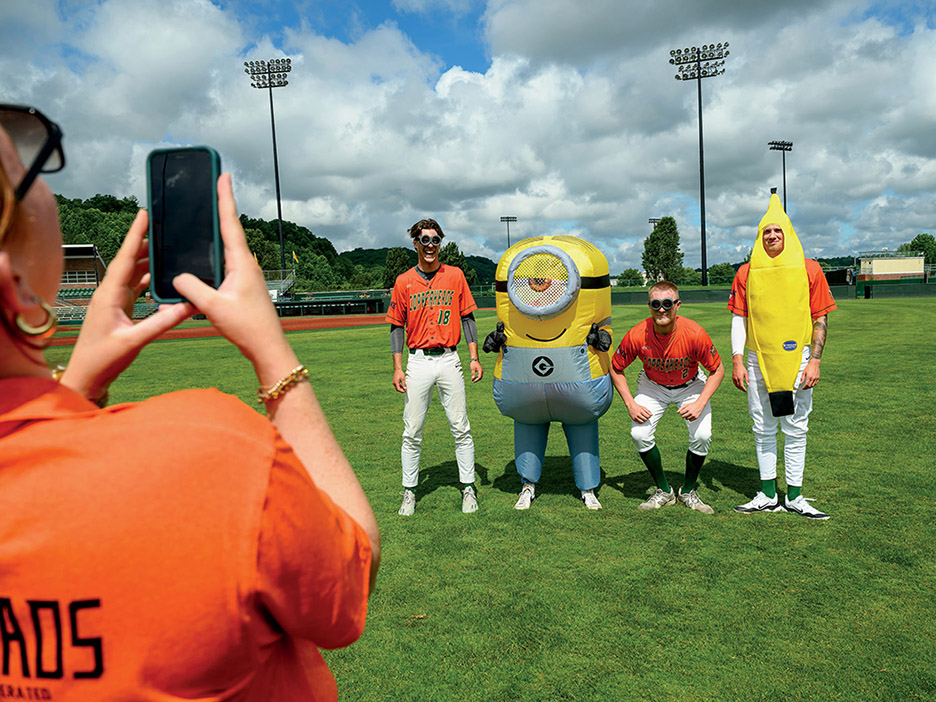
Sophomore and Director of Entertainment and Sponsorship Activation Kali Osborne planned a promotional tie-in to the release of “Despicable Me 4” that drove massive attendance, with nearly 1,000 fans in the stands on a Tuesday evening. Photo by Ben Wirtz Siegel, BSVC '02
Theme nights raise funds and awareness, while partnerships with local businesses—Precision Imprint and Zonez for merch, Larry’s Dawg House for concessions—and volunteer activities like reading to children at the Athens Public Library or building a playground for Alexander Local Schools create “a fun experience for the students that makes Athens feel like home,” Lietzow says. The team has even collaborated this summer with Jackie O’s to create Homer’s Hazy, a hazy IPA with pineapple and tangerine named for the team’s mascot; it’s available at games and 10 Uptown Athens locations.
While community engagement and affordable entertainment are the Copperheads’ top priorities, the experiential learning opportunity for student directors and game-day staffers is another highly valued component of the organization.
“I can’t imagine an internship with more sense of ownership over their tasks,” says Lietzow, who also serves as the assistant director for experiential learning design on the University’s Student Success Team. “With experiential learning, its five pieces are mentorship, engagement, challenge, ownership, and self and social awareness. I would be hard-pressed to identify anything that has a deeper implementation of those components.”
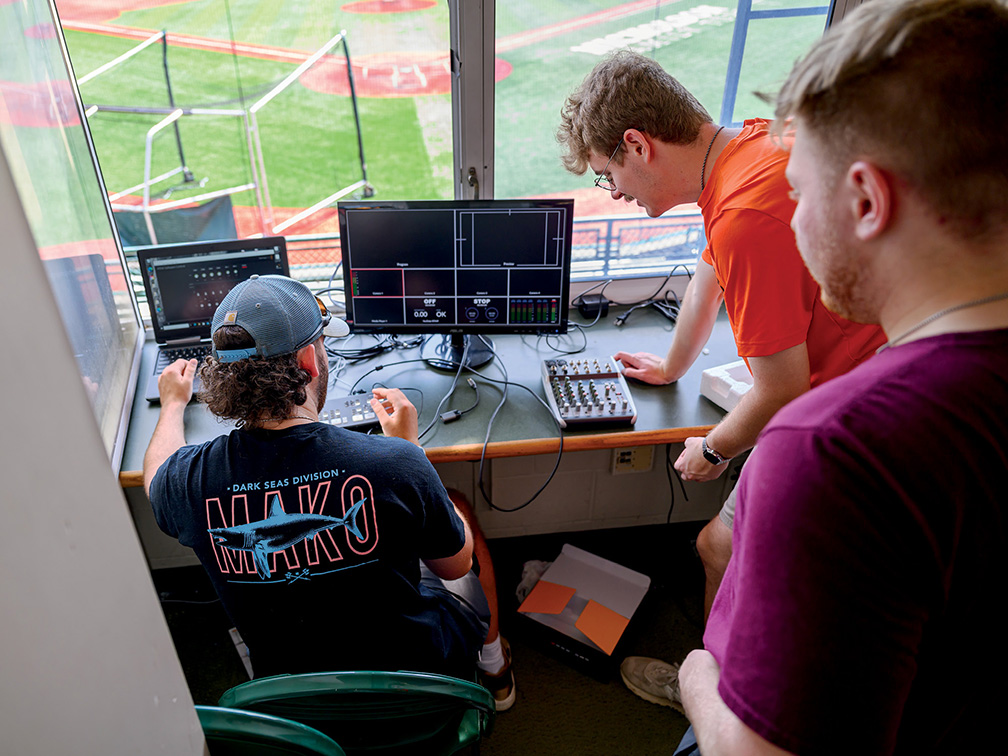
Director of Broadcasting and Play by Play Gavin Carrig, a sophomore, shows his staff how to use new equipment funded by a recent grant. Photo by Ben Wirtz Siegel, BSVC '02
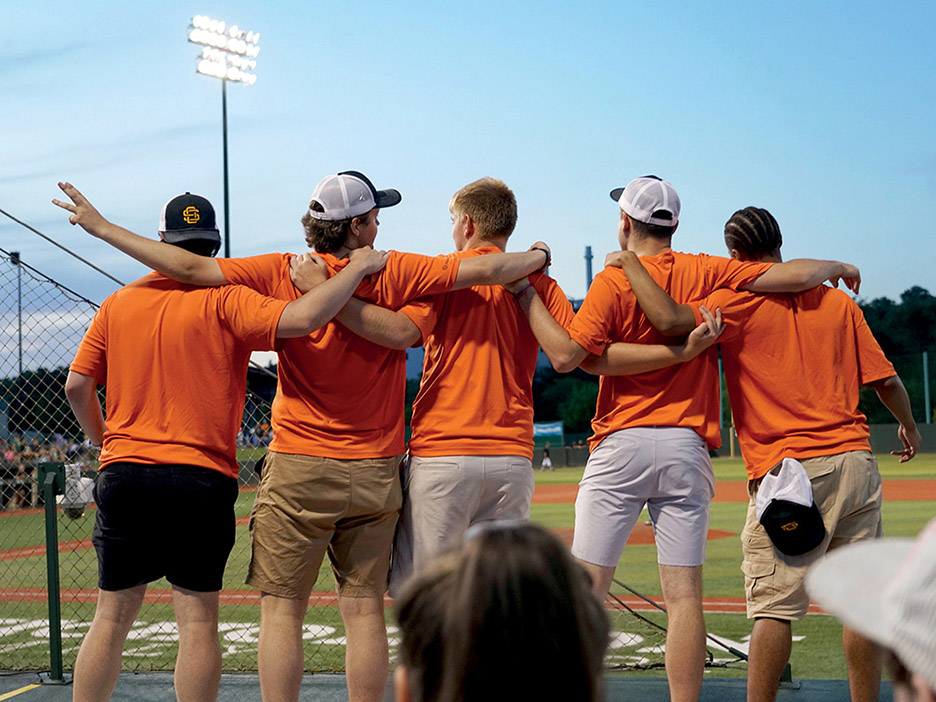
Copperheads staffers often go on to the major leagues in sports administration roles, says Copperheads executive board chair and team president Bill L'Heureux, BSC '96. Photo by Junior Conor Mallonn, Copperheads staff photographer
Student directors begin their roles in the spring and receive guidance from the organization’s executive leadership and board until the season kicks off in June, with what Lietzow describes as a gradual release of responsibility.
“It’s scaffolded appropriately so students feel ready to take on these large challenges in authentic contexts and be successful,” he says. “They’re learning from each other, and they’re learning through their own successes and failures.”
But student directors tend to see more of the former than the latter, L’Heureux notes.
“I love seeing these kids going on to the major leagues, and I’m not necessarily talking about the people on the field,” he says. “The student directors that we have go on to the major leagues in all sorts of different sports administration positions. Seeing that warms your heart.” He cites as examples two of the 2023 season’s Cheaders who now work with the Cleveland Guardians and Columbus Fury.
Both L’Heureux and Lietzow credit such success—and that of the team’s unique model—to the students who run it each year.
“When you come to Bob Wren Stadium and you see the production that we put on—on and off the field—it’s just a class act all the way around,” L’Heureux says. “And coming from a small, community organization, there’s just not a lot of money to go around.”

The Copperheads take on the Muskegon Clippers at Bob Wren Stadium in June 2024. Photo by Ben Wirtz Siegel, BSVC '02
While the Copperheads partner with Ohio University, it is not a University program and therefore does not receive direct funding. As a 501(c)(3) nonprofit, the organization runs on an annual operating budget of just $225,000, which supports staff and coach salaries, student stipends, team housing and travel expenses—and, most importantly, low costs for fans. Tickets are just $5, and leadership has no plans to raise rates, Lietzow says.
“Where can you go in this day and age to get four hours’ worth of entertainment for five bucks?” L’Heureux asks. “We as an organization make it so that the community is able to enjoy the game. And without the support of our students, it would be—I’m not going to say impossible, but man, it would be really, really difficult.”
Featured photo by Ben Wirtz Siegel, BSVC ’02



